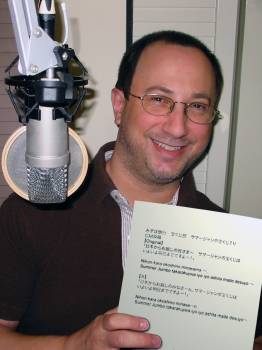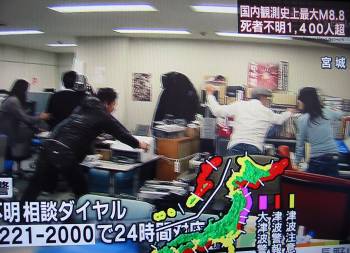|
Japan Quake: Dive Under Table ...
My Wife OK? Feeling Helpless ...
 Living in Tokyo, voice talent Mark Weitzman recently wrote for VoiceOverXtra about voice acting in Japan (read it here). Today, his world is upside down as he relates his experience in the incomprehensible tragedy that has shaken Japan ... Living in Tokyo, voice talent Mark Weitzman recently wrote for VoiceOverXtra about voice acting in Japan (read it here). Today, his world is upside down as he relates his experience in the incomprehensible tragedy that has shaken Japan ...By Mark Weitzman
Voice Actor
March 12, 2011
2:30 p.m. in Japan
TOKYO, Japan - We are fine. Everyone is fine. Tokyo is relatively unaffected.
The quake happened yesterday around 2:30 p.m.
I was home, sitting at my desk in my living room.
My wife was at the Yamada Bee Farm retail store - they sell honey, not bees - which she manages in a shopping center a few blocks from our apartment.
MANY QUAKES HERE
Usually, quakes here end after 5 to10 seconds. There’s not even time to react. Sometimes up to 30 to 40 seconds.
The 4s and 5s on the magnitude scale can be distressing. Sometimes they build slowly and end in a jolt. Sometimes it’s just one big jolt.
We rarely feel aftershocks.
But as they say on the news, we are “used to” those quakes.
Technically, quakes are happening all the time, but their magnitude is so low we can’t feel them. Whatever you hear, Japanese are NOT used to such *huge* quakes.
'EVERYTHING WAS RATTLING'
 But at the start of this one, I knew it was going to be different. It didn’t end when it was “supposed to” end. But at the start of this one, I knew it was going to be different. It didn’t end when it was “supposed to” end. Photo is from TV screen, of video shot during quake.
It was a long quake - you may have heard four to five minutes from first tremors to the “end.”
Everything was rattling. My brand new, very heavy 27-inch iMac desktop computer jerked toward the edge of my desk.
SHAKING VIOLENTLY
As the quake progressed, I got up from my desk and stood in a doorway.
I could see out the balcony window and watched the light poles and telephone poles and powerlines shaking violently.
We live on the second floor of a five-floor ferro-concrete apartment building built in the late 1980s. It met all the quake construction codes at the time. Lots of buildings in Japan are of similar construction.
The building shook from side, which was unusual.
UNDER THE TABLE
I felt dizzy. And it was noisy.
The shaking got violent, and I got under the dining table, next to my exercise fitness ball.
I rested my head on the chair seat.
THE 'BIG ONE'?
The adrenalin was rushing and I was telling myself not to panic.
Thoughts go through your head – is this The Big One? Is this building going to fall on me?
You know in the recent New Zealand quake that 28 Japanese died in a building collapse. That has been nightly news.
That quake was on my mind.
FEELING HELPLESS
Scrunched under the table, what can you do? Just wait for the quake to end.
It is a helpless feeling.
Then it stopped.
LOOKED OUTSIDE ...
I crawled out from under the table, stunned. I looked outside, and stepped onto the balcony.
Some carpenters who had been working on a new house down the street were standing in the center of the street.
A couple other passers-by were in the street, too, just standing there.
Other than that, I could not see any damage up and down the three streets I can see. It looked normal.
DIVE FOR TABLE
Then the first aftershock hit.
It felt like the initial quake, and I went back under the table.
There would be one more aftershock that caused me to return to my spot under the table.
IS WIFE OKAY?
This was the worst quake I have ever experienced here.
And it turns out it was The Big One, but not directly under Tokyo.
The cell phone system was immediately out of service, and I heard that landlines were functioning, but I couldn’t get through to my wife’s store.
Anyway, there weren’t any sirens and no commotion nearby, and I could see the mall’s department store and site from my balcony, so I assumed they were all okay.
The landline started ringing about 90 minutes after the quake. Mobile phones shortly after. Family members “checking in.” All are well.
FLYING OFF SHELVES
From that point, it has been quiet and normal in my area. Probably you’ve seen some video of damages in Tokyo. Still, the damage is minimal compared to the destruction of the tsunami. Part of a Costco store fell down in a Tokyo suburb. That store is at the end of the line of our local train, about 20 miles away from us.
Yokohama took some major hits.
In Tokyo, the damage seems to be mostly indoors, things flying off shelves, falling off tables.
My file folders and some knicknacks fell over. First time that’s happened.
TSUNAMI DEVASTATION
What happens here is that any TV crew that out doing a story that by chance got video of the quake in progress, sent that video in immediately. So we saw lots of unedited shots of the quake causing destruction.
There is a dramatic shot of the sidewalk jutting up in front of a building in Yokohama.
The worst area is Northern Japan, Sendai, caused by the tsunami. By now you’ve seen much of the video.
Live video from an aircraft that was tracking the advance of the first Sendai tsunami was being broadcast. I watched that tsunami hit the coast and sweep across the land, watched it live. Tragic.
THOUSANDS STRANDED
Tens of thousands of people in Tokyo and throughout Japan could not get home from work, because all the trains had stopped and all the tracks had to be inspected before the trains could get going again. Luckily, Japan prepares for exactly this scenario, and emergency measures are in place.
There’s an annual Earthquake Preparedness Day here. There’s always some type of earthquake readiness drill going in any given community at any time.
So event arenas were opened, emergency kits distributed. Thousands stayed in emergency shelters overnight.
EMERGENCY NEWS
The public broadcasting system provides multi-language live emergency announcements on TV, radio and web broadcasting. There are methods to get information by email to a PC or mobile phone. There’s after-quake systems in place, too.
WIFE COMES HOME
My wife came home early because after the quake, the trains stopped, and there were no customers. The entire mall shut down early. She told me the power went off there - but not here at home - and she and her staff, instead of wisely taking cover, stood in front of the shelves and used their hands and arms to prevent items from falling off. She said she heard goods tumbling off shelves in the other shops.
ALERT - ANOTHER QUAKE ...
Watching the news together last night, around 9:30 an earthquake prediction alert popped up on-screen and the special warning beeps are heard - another quake is coming in 10 seconds!
This after a day of aftershocks.
So my wife jumps up and turns off the gas room-heater. It was then I realized that when I dived under the dining table earlier in the day, I’d not performed the basic tasks:
While I was under the table, the gas heater kept on heating the living room.
BETTER PREPARED NOW
After the 1995 Kobe quake, the government emergency response didn’t do too well. So the public got even more serious about quakes. Since 1995, we’ve been prepared to hit the road with our earthquake backpacks, or to “shelter in place” with our three-day supply of water, instant foods, toilet paper and a cardboad port-a-potty.
If we ever would have to leave our apartment due to a quake, the nearest evacuation area is just a few hundred meters from our apartment, along the flood plain of the Tama River.
EARTH STILL SHAKING
We've had two more aftershocks that I could feel overnight, and a totally new quake unrelated to the original.
This morning, the news reports there have been more than 50 aftershocks, and the other quake had occurred in central Japan.
There is a state of emergency at five nuclear power plants now. Radiation at one nuclear power plant is 1,000 times normal, may not be able to be contained, and people in a three-kilometer radius have been evacuated. Meanwhile during all this excitement, a friend pointed his camera at a TV screen yesterday showing people wearing helmets. I’m planning on getting us a couple of those.
ABOUT MARK ...
Mark Weitzman is a Tokyo-based voice talent performing English for TV commercials broadcast worldwide, movie and game trailers, documentaries, presentations and corporate narrations. His voice is also heard on mobile phone content, sporting event pre-game videos, arcade game prompts, soundtracks and other media. He represents Japanese voice talent who have home recording studios, and writes a fascinating blog about Japan, Let's Japan (see link below). "In 1995," he adds, "I married a Japanese woman from one of my Berlitz group English lessons. She manages a retail boutique honey store chain outlet in a shopping center nearby."
Email: vo-info@letsnarrate.jp
Lets Japan blog: www.letsjapan.markmode.com
 Your Daily Resource For Voice-Over Success
|
As of the NEW website launch, 03/22/2012







.png)

Dan Deslaurier
See the earthquake helmets and other TV screenshots:
http://www.flickr.com/photos/57411077@N05/
Based on my experience with live news reports from Japan by international broadcasters, I recommend BBC World or any BBC reporting. BBC has a full time reporter in Japan year-round. CNN reporters cover the Asian region, and come and go.
The CNN reporters in Japan right now *do* seem to be correct in their reporting.
However, after the live CNN reports, the facts are too often mangled in the summaries and further broadcasts by the CNN anchors in the studio.
Overall, I recommend BBC. Also, the BBC reporters and anchors refrain from CNN's breathless theatrics.
CBS Evening News and ABC News is available here daily. In my opinion, their reporting about Japan at anytime is also accurate.
Meanwhile, the multi-language reports on NHK that had been so helpful earlier in the day evolved into an endless and unhelpful recorded loop of tsunami warnings, even to the point of playing over the live NHK bilingual 7 p.m. newscast Saturday night, until someone noticed and flipped off the warning loop audio several minutes into the newscast.
James
Glad you and your wife are fine. Thanks for sharing that scary experience!
John